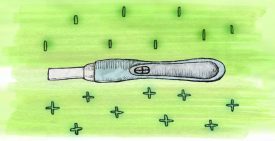
The day I found out my baby had died started out storybook perfect: an 11 a.m. ultrasound, our daughter in daycare, we’d find out the baby’s sex and celebrate whatever the outcome was over lunch. Then we’d pick up our daughter and start video calling our parents. Even though I was past the three-month milestone that pregnancy etiquette deems safe for sharing news, we hadn’t wanted to tell our parents until we knew the gender. It just seemed more fun that way: to dial the many numbers that it took to connect with my French in-laws, announce that they were going to be grandparents to another baby boy, or girl.
Walking into that doctor’s office, we must have presented as a happy couple—dressed carefully and eager, lots to be thankful for already, and my rounded belly suggesting more good fortune ahead. The nausea that had had me landlocked for most of that wet spring had lifted over the past few days, comparable to my first pregnancy, when reaching the second trimester was like a border crossing between misery and light. I felt good. Things were better with my husband. The pregnancy had provided a stop-gap to the year of squalls behind us—arguments were rarer, now. I felt confident, and light.
The technician came in. My husband sat down on a fold-up chair off to the side, hunched in his many layers. It was May, but it was cold. I lifted up my long sleeve shirt and took in a breath, preparing for the contact of the slimy gel that coated the probe’s nub. I turned my attention to the screen. I heard my husband lean forward in his chair. I watched the technician’s mouth tense ever so slightly. It happened in a millisecond. Barely a flinch. But I saw.
The technician asked me who my doctor was, without making eye contact. My entire body began to fill with this vicious mixture of disbelief and excitement that comes when you realize that something awful that happens to other people is happening to you. I remember wanting to laugh, wanting to grab my husband’s hand and go out for our planned lunch willfully ignorant of whatever verdict was about to be handed down. I didn’t want to witness the doctor’s stiff patience, the technician’s bitten lip, both of them waiting through the silence after the announcement to see if I would cry. I wanted to skip past the aphorisms and protocol of the Difficult Conversation to me in our dark bedroom, silence burning in my ears and the baby truly gone so that I could contemplate his loss without him still inside of me. We did get that one answer, though. The baby had been a boy.
I wanted a second child for years after my daughter’s birth, but by the time my husband caught up with his own readiness, I wasn’t so sure any more. Our daughter was two years old by then, and my relationship with her had become challenging. I’d aced the purely caretaking stage of parenthood: as a Virgo, I’ve always been a fan of lists, and the ability to check my daughter’s distress against a narrow checklist of discomforts (wet diaper? Hungry? Tired?) necessitated a little bit of time and planning for a warm reward. When her universe was small and her needs basic, it was so fulfilling to make her world complete.
But at two years old, those needs became existential, murky, and incredibly complex. All of the sudden, I had a child who was starting to experience things like sorrow, shame. And boredom. Boredom! The little baby who used to get a full hour of pleasure from an empty Tupperware now needed me to jester her diversions. These games required energy, and time. I never felt like I had either.
Odd then, that I’d been relentlessly lobbying my husband for a second child. The early stages of motherhood had been so pleasurable for me, I think I was obsessed with getting back to that period where my body held most of the solutions, where I felt tired—sure—but also powerful, beautiful, and fully in charge. At 37, underweight, overworked and with a spirited two year-old becoming her own person, I felt none of those things anymore. Even my professional life—a domain I’ve always had a death grip on—was slipping from my control. My debut novel, which did unexpectedly well in hardcover, grossly underperformed in paperback, finding me on a nationwide tour giving readings not to the ecstatic hordes my publisher had imagined, but to sleepy, single digit crowds. I had mere months left to turn in my contracted second book, a project I was nineteen drafts into, and still had no idea what it was about. We had a horrible car accident. We walked away from it, thankfully. But the stress of the accident and the financial strain of having a car totaled and the fact that my husband had been driving—all of this ignited resentments around parenting and the creative process that I didn’t realize I’d been carrying.
In this era of curated reality, it’s easy to throw an attractive filter on your home life, upload visual proof of your joy and your fulfillment. From the outside, we were the happy—if harried—self-employed creatives who liked impromptu dance parties and making late-night pasta, but once the guests were gone and the dishes on the drying rack, the theater fell apart. I was incapable of talking to my husband civilly. I was angry and fearful and anxious all the time, and because I was unable to say why, I said it was his fault. I was still convinced that a second child would fix things. How could he disagree?
Walls and doorknobs couldn’t shield our toddler from the discontent seeping through the house. My daughter responded to my unraveling by having inconsolable, shrieking temper tantrums, but only in my presence. This left me feeling even more frustrated and alone. After many months of this, I went to see a psychiatrist to placate my husband’s request that I “see somebody,” and was literally dumbstruck when the boyish therapist diagnosed me with a depression so severe, he didn’t think that I should drive myself home alone after the appointment.
Bad things happen to you—not just to other people. Depression does, too. For me, a lifelong overachiever for whom an A was never noteworthy unless it was accompanied by a plus, hearing that I was in the midst of a depression was laughable, until I felt my entire body slump with relief on this guy’s couch. At the moment of his diagnosis, the reasons why I was depressed weren’t nearly as important as the recognition that I was. If I was depressed, I had an excuse for stumbling in my mothering. For feeling unreliable as our family’s primary breadwinner. And after busting my husband’s balls for so long about having another kid, it was weird how blissful it felt to take that pressure off us. A depression. Medication. I was in no place to have a second child. I was giving me and my reproductive system a well-deserved time out.
I started weekly therapy with the bro-y therapist who categorized my sub-personalities into “exiles” and “firefighters” on an Office depot whiteboard, and although I left there smelling like the synthetic lavender from his scented noise machine, it did me worlds of good. I got an extension on my second novel. I identified activities that I could do with my daughter to make our relationship really ours: I started cooking with her, and on “girls’ days” we went to a nearby stable to groom horses and muck stalls and eat sticky peanut butter and jelly sandwiches with our dirty hands. I took the pink medication the psychiatrist had prescribed. I did my best to sleep. We went on a vacation to a place with lots of sun. While there, during what I thought was a “safe” spot in the calendar, me and my husband finally hit the sack.
Women—our intuition is a mighty thing. As fantastical as this sounds, I felt the fertilization happening while it was underway, and even though it was a poor time for it to happen—we’d both decided a pregnancy would be perilous to our relationship and to my mental health—I nevertheless thrilled to the fact that it was. A seemingly incurable insomniac, I snored that night for the first time in three years. My husband checked—you pregnant? Because pregnancy was the only thing that had ever kept me in my dreams. I laughed with him, but in that moldy Airbnb in the off-season Florida Keys, I already knew I was.
Becoming pregnant while I was struggling through depression gave me a stepping block to get up and over that depression. My system charged with progesterone, I started sleeping once again. The sleep restored my mind and clarity enough to want to stop my eleven-year marriage from completely bleeding out. We started couples therapy. We talked about our fears and our frustrations and the double-sided terror and excitement of being parents again. We had to come together, join the same team. I didn’t feel like we were ready for another baby yet. I didn’t feel like I was healed. But I no longer felt like I had to head into my uncertainties alone.
I had to give myself pep talks to stay positive, especially through the first trimester nausea, which was so bad this time around that I had to take frequent breaks from whatever I was doing to lie down on the floor. I had to believe that everything was going to turn out fine: our family, our marriage. Of all the things I fretted over, my pregnancy wasn’t one. My first one had progressed so healthily, I had no reason to worry about risks other than the ones that I had fabricated in my fragile mind.
When the doctor came into the ultrasound room during that second trimester screening, he introduced himself. He had been my doctor throughout my entire first trimester, which I pointed out. Flustered, he apologized. “Of course!” he said. “Of course!” He asked about my daughter. I was even more outraged by this question than by the fact that he hadn’t recognized me, or quickly scanned my chart. He’s asking about my daughter because there is something unfixable with this pregnancy, I thought. He’s reminding me of the good news before giving me the bad.
The bad news was that our baby had no heartbeat. And from the looks of it, he hadn’t for a while. Well before the doctor invited us to join him in his office, before the technician closed the door behind her so that we could compose ourselves in private, I knew that there was bad news underneath this. Acres and acres of heartache and confusion laid out for us both. We weren’t going to be parents to this child, not now. Our little girl wouldn’t be a sister. The gate that I had closed against depression might swing open again. Plus, if the baby wasn’t alive any more, it would have to be taken out.
An administrative error had delayed the prenatal bloodwork I’d submitted weeks earlier, so it wasn’t until hours after we’d been told that we’d lost the baby that we also understood why. The blood screens came back showing that the fetus had a 99.9% chance of having Downs. We were already home when the doctor called me with this information, and I could tell by the way his tone of voice dropped across the telephone, waiting for mine to go up, that he expected I’d be relieved to hear this. What a bullet I had dodged! From the fetal measurements, he said the baby had been without a heartbeat for a week. Exactly the amount of time that I’d been feeling nausea-free.
I was quiet. I remember being quiet. I was sitting outside, my ear to my cell phone, my eyes on this pretty pond we have and the courting pair of ducks that had recently returned to it. I did not feel relieved. What I felt, and what I still feel, is touched.
To be clear, depressed or happy, I don’t think that I’m the kind of person who can raise a child with a mental and physical handicap as severe as Down’s. What moved me was that this tiny little fetus, (The size of a lemon!, chirped the ill-timed pregnancy newsletter in my inbox), didn’t make me choose. He decided for himself that he couldn’t continue. It was a feeling I don’t think I’ve ever experienced in all my thirty-eight years. Mercy. Mercy was exactly what it was.
It’s been a year since we lost that baby, and I vacillate between considering my miscarriage as a commonly experienced misfortune and an uncommon gift. His loss meant that I didn’t have to rise to the occasion of mothering a second child. Didn’t have to fast track my mental and physical recovery from depression. Didn’t have to put patches on the frayed places in my marriage, could slow down and take the time to understand why they had ripped. And also, I could focus on my surprising daughter. Keep developing the confidence and tools to mother her well, and right. I wouldn’t wish a miscarriage on anybody. And I don’t think I’d be able to have as positive of an outlook if such a loss came my way again. But this is how I choose to see the situation today: even though he was only with us for four months, that little baby brought a lot of good into our family. He brought me peace when he arrived. He brought me peace when he left. His exit wasn’t desired, but it was full of grace.
Courtney Maum is the author of two novels, “Touch” and “I Am Having So Much Fun Here Without You.” In addition to writing fiction, she’s also a professional namer, creating product and shade names for companies like Target and MAC Cosmetics.








